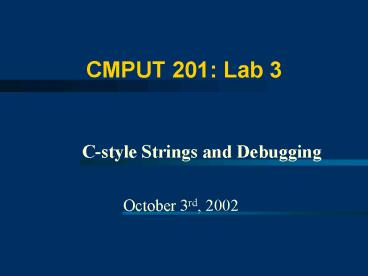CMPUT 201: Lab 3 - PowerPoint PPT Presentation
1 / 9
Title:
CMPUT 201: Lab 3
Description:
Often it's necessary to provide a program parameters (such as names of files to ... A modified version of the main' function uses two special variables argc' and ... – PowerPoint PPT presentation
Number of Views:34
Avg rating:3.0/5.0
Title: CMPUT 201: Lab 3
1
CMPUT 201 Lab 3
C-style Strings and Debugging
October 3rd, 2002
2
Command Line Arguments
- Often its necessary to provide a program
parameters (such as names of files to use) from
the command line - This is done with command line arguments
- programName arg1 arg2 arg3 ...
- A modified version of the main function uses
two special variables argc and argv to access
command line arguments
3
Command Line Arguments
- int main( int argc, char argv ) ... if
(argc gt 1) cout ltlt Program name ltlt
argv0 ltlt endl - argc contains the number of parameters, which
includes the program name (so in a program called
with one option, argc 2) - argv contains an array of strings that holds
the arguments (so argv0 is the program name,
argv1 the first parameter and so on)
4
C-style Strings
- In C there is no built-in string class strings
are implemented simply as character arrays - These arrays contain the characters in the
string followed by a null byte that is
represented as \0 - \0 is an escape sequence like \n (the
newline character) that marks the end of the
string - C string manipulation functions depend on the
presence of \0 since this tells them when to
stop reading the string
5
C-style Strings
- So a strings size is always one more than the
number of text characters it contains - char str hello
- This string is 6 bytes long and is stored as
- str0 str1 str2 str3 str4 str5 h
e l l o \0 - The above declaration is equivalent to
- char str6 hello
- since this string is 6 bytes long
6
C String Pitfalls
- You can not use a C string variable the same
way as other variables in assignment or
comparison expressions - You can use the assignment operator after a
string only in initialization - // this is acceptablechar myString20 alpha
beta - // this is illegalmyString gamma
- You can not use the comparison operator to
test if two C strings are equal
7
Built-in String Functions
- The following functions are included in the
library cstring - Function Description
- strlen(str) Returns the length of str
without \0 - strcmp(str1, Compares the two strings
alphabetically str2) Returns
zero (0) if they are equal, non-
zero otherwise - strcpy(dest, Puts the contents of source
in dest source) source remains
unchanged
8
Built-in String Functions
- Function Description
- strcat(target, Concatenates target and
source and source) places the
result in target - strstr(ref, Returns the position of the
first search) occurrence of search
in ref - To use any of these functions, your program
must include the cstring library - include ltcstringgt // should be at the top of
your program
9
Debugging
- Many interactive debugging tools exist for
Unix we will use Data Display Debugger (DDD) - You must compile all the modules (the .cpp
files) with the g flag in order for DDD to
understand how to debug your application - To debug an application, type
- ddd tokenize1
- The debugger window then opens with a display
of the module containing the applications main
function































